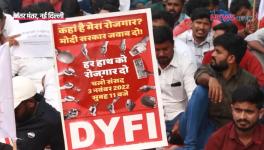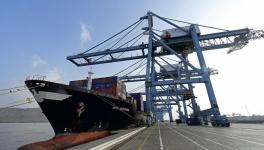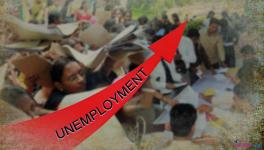Punjab Elections: Border Towns Face Crisis as Indo-Pak Trade Remains Suspended Since Pulwama
It’s the oldest road on the continent connecting all major cities in north India. As one traverses through Grand Trunk Road from the historic city of Amritsar to Attari, the last town on the Indian side of the border, the picturesque visuals of Khalsa College and War Memorial emerge to highlight its importance. However, the landscape changes fast as more minor villages with a meagre population start to appear.
A peculiar phenomenon that suddenly hits the mind is the line of abandoned trucks dumped across the roads. The trucks once plied on the streets with their might but abandoned now after India suspended its trade with Pakistan post-Pulwama attack in 2019.
Locals maintain that suspension of trade with Pakistan triggered mass unemployment in Amritsar, Gurdaspur and Tarn Taran, where thousands of workers were employed as truck drivers, coolies, painters, mechanics, clearance agents, waiters. The trade at the international border also boosted local businesses as traders engaged with their counterparts to supply cement, fruits and vegetables, salt and industrial products.
However, the mammoth issue does not reflect in the speeches of political leaders in the state going to polls on February 20. Amarinder Singh, former Chief Minister of Punjab, represented Lok Sabha's constituency from 2014-16. Navjot Singh Sidhu, Present President, Punjab Pradesh Congress Committee, too represented it in the Lok Sabha. Yet, the campaigners are not talking about the issue.
NewsClick travelled to bordering areas of Amritsar to understand the casualty of suspension of trade. The desperation of locals could be easily understood. Border Security Force (BSF), mandated to secure the country’s borders from outside infiltration and smuggling, enjoys bitter relations with residents of local villages. The residents allege that agriculture in this region is quite an uphill task.
The force does not allow them to cultivate any crop that could grow beyond three feet, decimating prospects of growing cash crops like sugarcane, maize, cotton and kinnow. Beyond Amritsar, hardly any industrial units could employ a swelling mass of unemployed youth. Punjab is already witnessing the mass migration of 1.5 lakh youth per year due to unemployment in the state.
Pointing at his farms, Gurdev Singh from Mohawk village showed the fencing of the international border. He emphasised that they spend much less time on farms overlooking the crops. “While the allowed time for cultivation is 8 am to 5 pm, we are often told to vacate as early as 2 pm. We cannot look after our farms enough. Similarly, the people have been booked for smuggling even when smugglers dump drugs and arms in any farm and flee to prevent arrests.”
Back in Mohawk, Ranjit Singh narrated his ordeal. He said that unemployment had forced the youth to engage in unsocial activities like theft, pickpocketing etc. “Even though I own about 6 acres of land, I worked as a mechanic because the income from farms is not enough. The private schools are fleecing parents by demanding an exorbitant fee. To educate standard V students, one needs to pay Rs 2,500 per month. If one gets ill, he cannot afford expensive tests. Some simply die because they have no money for treatment. Subsequent governments did nothing to improve the situation. Our only hope remained with trade but it is too closed for more than 2.5 years.”
A disappointment runs deep among people running small businesses at Attari Bazar where thousands lost their income. These businesses depended not only on trade but thousands of tourists too who came to visit Wagha Border. Covid restrictions led to the closure of the daily ceremony when both sides closed their doors.
Harjit Singh Soni runs a small dhaba cum hotel Saanjh Haweli in Attari Bazaar. After the closure of trade, his business stands decimated. “I once employed 35 workers. Some workers came from Bihar, UP, while some came from local villages. People had to wait to get a seat in my dhaba (roadside eatery). Traders from across the country stayed in rooms as clearance, loading, and transportation took days at Integrated Check Post to reach the material's destination. I now employ four workers, including two waiters, one cook and one sweeper. For how long, I could pay them if there is no income? When there is no income, people were forced to take their children from private schools because they were not ready to give two extra days to submit fees. The small farmers already have no income. The inflation wreaked havoc in households with skyrocketing LPG and cooking gas.”
Another dhaba owner said that he too had to let workers go after trade stopped. “I employed 22 workers when trade and ceremony were conducted. Now they are gone. My savings have been exhausted. For 2.5 years, I barely managed. Covid period remained a tough battle. I would request the Central government to begin the ceremony.”
Nirmal Singh from the village said that the local traders are very interested in trading with Pakistan as it brought cheap cement, rock salt and gypsum. “What’s the point in building such a massive land port when you are not trading. The trade should open now. The truck stand here is in tatters. Many transporters dumped their trucks in farms because there was no demand.”
When asked about youth migration, Singh gets emotional and said, “They are going to foreign lands because there is no work here. We also know that they would not return. There would be no one here who could offer us a glass of water. But what to do? Their youth is getting destroyed.”
Closer to the border, the office of Attari Truck Union has very few transporters now waiting for orders. A conversation here with these transporters reveal the true extent of damage to businesses. Amritdes so badly that few transporters committed suicide, and some slipped into depression. We took out children from convent schools and admitted them in schools where they would get subsidised education.”
Singh also refutes the argument that the India-Pakistan trade was too small to impact the economy. “The integrated check post at Attari generated the highest revenue for Indian government among its land ports. It invested Rs 150 crore in building it. Now, only wild grass grows here. The people talking in television studios do not have any ground experience of trade and its impact. Not only Amritsar but Gurdaspur and Tarn Taran’s workers too worked here. It is an issue here, but no media comes here to understand our problem.”
Economic experts echo similar sentiments while trying to document revenue and employment loss. Nikita Singla, Associate Director at Bureau of Research on Industry and Economic Fundamentals (BRIEF), an independent think tank based in New Delhi, told NewsClick that it's time to start looking at the India-Pakistan trade from the lens of livelihoods.
She said, “National security is of utmost priority, and cross-border trade procedures need to be strengthened accordingly. Amritsar is land-locked, is not a metropolis and traditionally has no significant industry. It is not like Mumbai, where suspension of trade with one country has little impact on its locaep Singh, who once owned six trucks, now works as a clerk in the union's office.
Taking to NewsClick, he said, “the union's membership has reduced from 165 to 55. The members had 700 trucks out of which 500 trucks have been sold. The banks and financers took away these trucks after repeatedly failing to pay EMIs. It hit ul economy and business. Any decision regarding the India-Pakistan trade has direct implications on the people of Amritsar and adjoining areas. Post-February 2019, I estimate that about 50,000 people have been directly impacted by the suspension of trade. And Amritsar lost nearly three-quarters of its Rs 30 crore monthly economy.”
Singla, Author of Unilateral Decisions, Bilateral Losses added that there need to be constructive attempts to boost the local economy on the connectivity front. “Locals have proposed faster execution of the Patti-Makhu rail project—a 25.47 km-long rail link across Punjab, between the Patti area in the district of Tarn Taran and the Makhu region in Ferozepur district—that would reduce the distance travelled to Mumbai from Amritsar by 240 km. So, these are the issues that need real-time attention.”
The report noted that 9,354 families included 1,724 traders, 4,050 trucks, 2,507 labour, and 126 custom agents. The report said that revoking Pakistan's Most Favoured Nation status led to a significant drop in Pakistani exports to India. “In 2018-19, bilateral trade between India and Pakistan was valued at USD 2.6 billion; India’s exports to Pakistan accounted for USD 2.06 billion, and India’s imports from Pakistan were at USD 495 million. The Indian government’s decisions—withdrawal of MFN status and imposition of 200% duty— hurt Pakistan’s exports to India, which fell from about USD 45 million per month in 2018 to USD 2.6 million per month in March-July 2019.”
Another report ‘Economic Implications of Trade Curbs between India and Pakistan through Wagha Border’ conducted by the Centre for Research in Rural and Industrial Development, Chandigarh authored by RS Ghuman and Haqiqat Singh highlighted, “Before the imposition of 200 per cent customs duty, the revenue from customs duty was Rs 457.80 crore on during 2018-19 (up to February 2019) which came out to be Rs 41.60 crore lakh per month. But during March-December 2019, the monthly average was just Rs 19.80 crore; despite the hike in customs duty, the huge decline in imports from Pakistan.”
It continued: “In fact, this duty also includes a custom duty on imports from Afghanistan, which was not affected by the trade embargo. In addition to the customs duty, the Plant Protection, Quarantine Storage Department collected revenue from its services to the tune of Rs 5.38 crore (average monthly Rs 51 lakh) during 2018-19. After the hike in customs duty, the monthly average was just Rs 63,700 in September 2019. The earnings of the Central Warehousing Corporation also came to zero from Rs 53.28 crore (monthly average, Rs 4.44 crore) in 2017-18. Thus, together with these three sources annually earned Rs 516.16 crore before the trade curbs which dried up after the trade embargo.”
Haqiqat Singh, one of the authors, told NewsClick that the political parties are very much aware of the issue, but their silence is inexplicable. “We prepared the report and presented it to leaders but their disinterest could not be understood. As far as Punjab is concerned, it is losing Rs 5000- Rs 7000 crore annual revenue from this business. The World Bank suggested that the route has the potential to trade 37 billion US dollars. The ban is also contrary to the policy of One District, One export item. In terms of loss, we lost the opportunity of having superior quality cement and gypsum at cheaper rates. The traders have now found Dubai route to import materials but it is costing us dearly.”
Get the latest reports & analysis with people's perspective on Protests, movements & deep analytical videos, discussions of the current affairs in your Telegram app. Subscribe to NewsClick's Telegram channel & get Real-Time updates on stories, as they get published on our website.
























